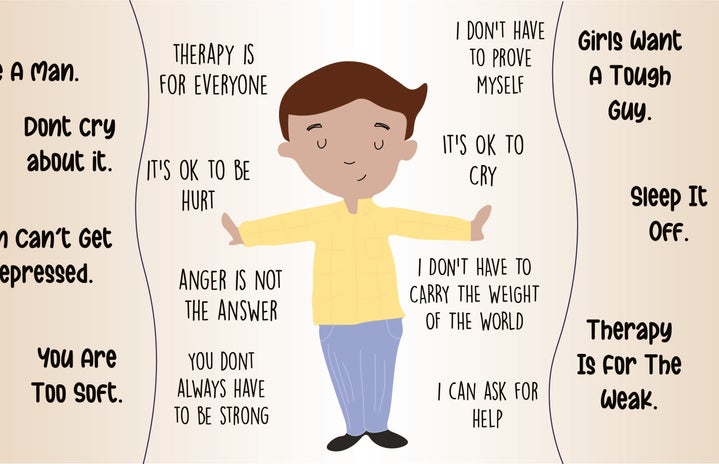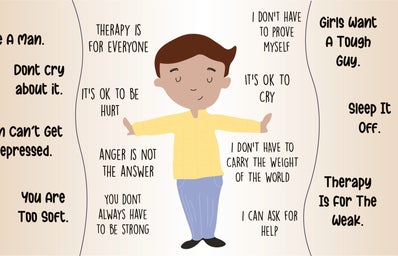A persuasive recommendation and my incessant curiosity led me to a weekend binge-watch session of the highly acclaimed crime-thriller show ‘Mr. Robot’. As an avid reader and supporter for mental health awareness, it was refreshing to see two mental illnesses: Dissociative Identity Disorder (DID) and Schizophrenia (that are often disregarded), portrayed openly in the show. What surprised me was the compelling and raw narrative of the main character’s panic and anxiety attacks. However, this left me with a trail of questions on the degree of authenticity in the display of men’s mental health vulnerabilities.
Our society is to blame for the stigmatisation of mental health – the lack of education on mental illnesses holds them as a taboo in families. The talks of psychiatrists and therapies are often hushed up or belittled. In addition to this, there aren’t enough safe spaces for people to confer about mental health.
In India, the numbers show that about 170 million people are affected by one or more mental morbidities. Lancet Public Health’s medical journal has stated that women tend to have higher rates of depressive disorders than men. However, the suicide rates amongst men are about twice that of women (the gender-ratio in India counters this statement). Keeping in mind that prevalence of mental health disorder is almost equal in both the genders, it is safe to say that there could be data collection errors in the surveys; this is highly emphasised in studies.
These numbers reflect that publically opening up about mental health is challenging for various reasons, be it: lack of awareness, backward economic or financial background, etc. Psychological treatments are often viewed as taboo both in educated and uneducated groups. The National Mental Health Survey of India published jarring statistics on the treatment gap for mental disorders in the country. The numbers range from 28% to 83% for mental disorders and 86% for alcohol use disorders. Most people either did not seek help or were not able to access proper facilities for the same. Numerous studies have also shown that women are more likely to seek treatment for mental health than men.
In his TED Talk, American actor Justin Baldoni opened up about how he’s done being “man enough”. He talked about how being caught up in the role of being masculine and robust; men have always refrained from talking about their insecurities and vulnerabilities in fear of social rejection or isolation. Deviating from the traditional norms of masculinity would categorise them with female stereotypes, and hence making them “emotional”, ‘soft’ or ‘weak’.
“This is the script we have been given —girls are weak, and boys are strong. This is what’s being subconsciously communicated to hundreds of millions of young boys and girls all over the world,” Baldoni proclaims to the crowd.
The society imposes stereotyped gender-role behaviours on people from a very young age; from clothing, colour preferences, participation in ‘masculine’ and ‘feminine’ activities, to much more. A boy playing with barbies, donning skirts and make-up and projecting emotions is bullied and deemed unnatural. Children are often subject to abuse and violence if they don’t conform to rigid stereotypes. The social conditioning to adhere to typical masculine norms is so strong that it can eventually lead them down the path of “toxic masculinity”.
Toxic masculinity enforces several rigid characteristics or behaviour. Men are told that they have to be dominant, restrictive, and more importantly, silent about their problems. The established societal expectations of being the sole breadwinner and caregiver of the family still prevail. Even in modern times, substance abuse is seen as a standard coping mechanism and is hailed as a ‘masculine’ trait. It isn’t limited to personality traits, and extends to physical features as well; washboard abs and chiselled features are the idealised male body standards.
One of the reasons men suffer from depressive episodes is due to the lack of self-esteem, and the media only adds fuel to this fire.
In most mainstream movies, “masculinity” plays into the male character’s personality. Characters without these “masculine features” are often viewed as awkward, comical or ludicrous. Though there are body positivity campaigns and culture are focused on men, it is very scarce in mainstream media.
We can see an excellent example of how men’s mental health is trivialised in Marvel’s Avengers: End Game. The movie treated Thor’s weight gain, depression and substance abuse as a funny trope. In another example, Will Smith’s face was splashed on every social media page as a meme after his marital issues went viral.
Another reason why men fear to speak up is because of how easily they can be dismissed or humiliated by others for showing a brink of emotion. Male victims of abuse suffer from this dilemma as well and refuse to voice-out their trauma. Celebrities like American Rapper’ Common’, Terry Crews and Tyler Perry have revealed that they have been a target of sexual abuse while emphasising on how men tend to suffer in silence, burdened by the lack of confidence in expressing their feelings in the male community.
The consequence of toxic masculinity and its role in the amplification of men’s suffering is a complicated situation to comprehend and defuse, but there are various online resources for men.
A Reddit sub ‘r/MensLib’, a discussion forum for men’s issues, created a comprehensive list of resources for men. It consists of a variety of organisations and help-guides broken down by the issue category. Bhavya Kulshrestha, a psychologist, created an online list of resources for mental health services during the lockdown on Instagram. Furthermore, iCALL Psychosocial Helpline has also published a list of ‘Mental Health Professionals We Can Trust’ in 2018.
There is a severe lack of research surrounding how men perceive the idea of professional help. It is imperative to study the necessity of customised mental health awareness programs explicitly targeting the male gender.
However, to successfully try and bring real change, we need to be aware and understand that the idea of masculinity has affected the mental health of all the communities, including men’s. Psychologists have often tried engaging men in a gender-specific treatment for their problems. The problem further lies in the lack of normalisation of seeking therapy.
So what can we do to help? It is simple, talk to the men in your life. Engage in conversations, even with those who are uncomfortable. These conversations could serve as an act of acceptance and relief for them. We, as humans, need to be patient to support and be receptive to a person’s vulnerability. Seek professional advice when necessary. Even if they refuse to get help, let them know that there’s no judgement in asking for it. Most importantly, teach the kids in your life that brave boys do cry.


